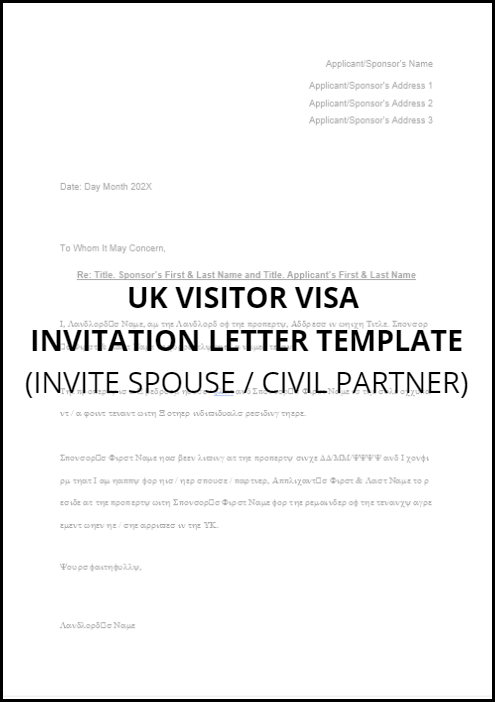Changes To UK Visa Applications: Impact Assessment By Nationality

Table of Contents
Impact on EU/EEA Nationals Post-Brexit
The most significant shift post-Brexit has been the loss of free movement rights for EU/EEA citizens. This has dramatically altered the UK visa application process for this group.
Loss of Free Movement Rights
The era of frictionless movement between the UK and the EU/EEA ended with Brexit. The previous system of free movement, allowing citizens to live and work in the UK without needing specific visas, is now history. It's been replaced by a points-based system, demanding applicants meet specific criteria to qualify for a visa.
- Work: EU/EEA citizens now require a Skilled Worker visa or other relevant work permits to legally work in the UK.
- Study: Students from the EU/EEA must now obtain a Student visa, fulfilling specific academic and financial requirements.
- Family Reunification: Family members of EU/EEA citizens residing in the UK face stricter rules and increased documentation requirements for family visas.
This shift has resulted in increased application fees and significantly longer processing times compared to the pre-Brexit era. Many EU/EEA citizens are facing challenges in accessing the UK labor market and navigating the complexities of the new visa system.
New Visa Categories for EU/EEA Citizens
Several visa routes are available for EU/EEA citizens wishing to live and work in the UK, including:
- Skilled Worker visa: This is the primary route for skilled professionals seeking employment in the UK. Eligibility requires a job offer from a licensed sponsor, meeting specific salary and skill requirements.
- Family visa: This visa allows family members of those already residing in the UK to join them. Specific criteria and documentation are necessary to prove the relationship.
- Student visa: EU/EEA students now need to apply for a Student visa, proving their acceptance into a recognized educational institution and demonstrating sufficient financial means.
Applying for these visas presents unique difficulties for EU/EEA citizens, including unfamiliar application procedures, stricter eligibility criteria, and the need to adapt to a new, points-based immigration system.
Impact on Non-EU/EEA Nationals
The changes to UK visa applications have also affected non-EU/EEA nationals, though the impact varies depending on the specific visa category and the applicant's country of origin.
Existing Visa Categories and Changes
Existing visa categories for non-EU/EEA nationals have also experienced modifications. These changes include:
- Adjusted application procedures: Many visa applications now involve online portals and digital documentation submission.
- Revised requirements: Specific requirements for certain visa categories have been tightened, leading to increased scrutiny.
- Modified fees: Visa application fees have been adjusted for various categories.
Success rates for different visa types vary considerably within this group, influenced by factors such as the applicant's qualifications, the demand for their skills, and the overall strength of their application.
Increased Scrutiny and Security Checks
The UK government has implemented heightened security measures, resulting in:
- Stricter eligibility criteria: Applicants now face more stringent requirements regarding financial stability, criminal records, and overall suitability.
- Increased documentation requirements: A greater volume of supporting documents is often necessary, increasing the complexity of the application process.
- Longer processing times: The increased scrutiny and security checks have resulted in significant delays in visa processing for many applicants.
These changes aim to improve security and control immigration, but they have also created challenges for non-EU/EEA nationals seeking to enter the UK.
Impact Assessment by Specific Nationalities (Examples)
To illustrate the varied impact, let's examine specific nationalities:
Case Study: Indian Nationals
Indian nationals represent a significant portion of UK visa applicants. Changes have impacted various visa categories:
- Student visas: While many Indian students continue to seek UK education, the stricter requirements and increased competition have resulted in varying success rates.
- Work visas: The demand for skilled workers from India remains high, but successful applicants must meet the stringent requirements of the points-based system. Processing times may differ depending on the specific skillset and the visa category applied for.
Statistical data on Indian application success rates and processing times is readily available from the UK government website.
Case Study: Nigerian Nationals
Nigerian nationals also face unique challenges. Specific visa categories such as skilled worker and family reunification present particular difficulties due to increased scrutiny and documentation requirements. This may lead to longer processing times and lower success rates compared to other nationalities.
Case Study: Australian Nationals
Australian nationals, benefiting from existing agreements with the UK, may experience different challenges and potentially faster processing times than other nationalities.
Conclusion: Understanding the Changes to UK Visa Applications
The changes to UK visa applications have created a significantly more complex system impacting different nationalities in various ways. Understanding these changes is paramount for potential applicants, ensuring a successful outcome. The new system's complexities often necessitate professional assistance to navigate the regulations, documentation, and application processes effectively. For accurate and up-to-date information, always consult the official UK government website. Seeking expert advice on navigating the changes to UK visa applications is highly recommended to increase your chances of a successful application. Don't hesitate to seek professional help; it could make all the difference in your journey.

Featured Posts
-
 The Billionaire Without Berkshire Shares Canadas Potential For Leadership In Investing
May 10, 2025
The Billionaire Without Berkshire Shares Canadas Potential For Leadership In Investing
May 10, 2025 -
 Sag Aftra Joins Wga On Strike Line What This Means For Hollywood
May 10, 2025
Sag Aftra Joins Wga On Strike Line What This Means For Hollywood
May 10, 2025 -
 Plinta Dakota Johnson Kraujingos Nuotraukos Naujausi Atnaujinimai
May 10, 2025
Plinta Dakota Johnson Kraujingos Nuotraukos Naujausi Atnaujinimai
May 10, 2025 -
 Newark Mayor Ras Baraka Arrested Details On Ice Detention Center Protest
May 10, 2025
Newark Mayor Ras Baraka Arrested Details On Ice Detention Center Protest
May 10, 2025 -
 Dijon Rue Michel Servet Un Vehicule S Ecrase Contre Un Mur Le Conducteur Se Rend
May 10, 2025
Dijon Rue Michel Servet Un Vehicule S Ecrase Contre Un Mur Le Conducteur Se Rend
May 10, 2025
